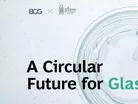BCG/GPI: 10 year roadmap to increase US glass recycling

Glass - an infinitely recyclable and continuously reusable material that doesn’t reduce in quality or purity. “Yet the US does not recycle nearly as much glass as it could,” explains Boston Consulting Group (BCG). Currently the country’s glass-recycling rate sits low at 33 per cent, while other regions such as Europe are closer to 70.
Increasing its rate to 50 per cent alone would have huge environmental benefits for the US, including diverting millions of tons of materials from landfills annually, and reducing greenhouse gas (GHG) emissions by 1.4 million metric tons annually (the equivalent of removing 300,000 cars from the roads).
In addition to the environmental benefits, businesses stand to gain from the country increasing its recycling rates. Manufacturers would benefit from lower costs as a result of making glass from cullet (crushed materials from post-consumer glass), while the recycling industry would benefit from hundreds of new jobs.
Boston Consulting Group (BCG) and the Glass Packaging Institute (GPI)’s 10 year roadmap
Setting the goal to achieve a 50 per cent recycle rate in the US by the end of the decade, the Glass Packaging Institute (GPI) has partnered with Boston Consulting Group (BCG) to develop a 10 year plan to achieve this goal.
The 10 year plan has three pillars:
- Leave no bottle behind ensuring that there is a way for consumers to recycle every glass bottle at a cost that is lower than waste disposal
- Transform the system by developing a recycling infrastructure that is capable of economically sorting, processing, and transporting glass to manufacturing sites
- Drive collective action by identifying collaboration opportunities between the private and public sectors, forging nationwide commitment

“We are energised by this new national initiative, and thankful for the opportunity to work with BCG on this project. Increasing the US glass recycling rate to 50 percent improves the supply of raw material for glass container manufacturing and would result in lower greenhouse gas emissions, create jobs and improve upon the already recognised sustainability performance of glass. It is an ambitious but achievable goal that can be accomplished with collaboration and cooperation within the glass manufacturing supply chain and with help from all levels of government. We are excited to begin this journey with the help of BCG, GPI member companies, and other stakeholders in the industry,” said Scott DeFife, President, GPI.
The challenges ahead
To realise this plan, BCG and GPI have identified eight challenges in the US today that glass container recycling is facing:
- Lack of consumer incentive to recycle if it is inconvenient, opt-in/subscription models have low participation
- Rising fees for recovering materials and pressures from waste management industry have resulted in less curbside recycling
- Lack of recycling mandates and high levels of contamination result in landfill disposal
- Low landfill fees incentivises sending glass to landfills
- Lack of capacity is hinders the ability to meet demands and reduces the incentive to invest
- For some regions the strong demand for cullet in other markets reduce the supply for glass containers
- The distance between the sources of and markets for cullet requires long-haul shipping
- Virgin materials are often cheap than cullet

“Glass is an infinitely recyclable material, but unfortunately in the U.S. it mostly ends up in landfills. We partnered with GPI to design workable solutions to reach an ambitious 50% glass recycling goal. Setting the goal is not enough. We must all continue to work collectively to help transform the recycling system end-to-end,” said Elfrun Von Koeller, Managing Director & Partner of BCG.
For more information on manufacturing topics - please take a look at the latest edition of Manufacturing Global.

